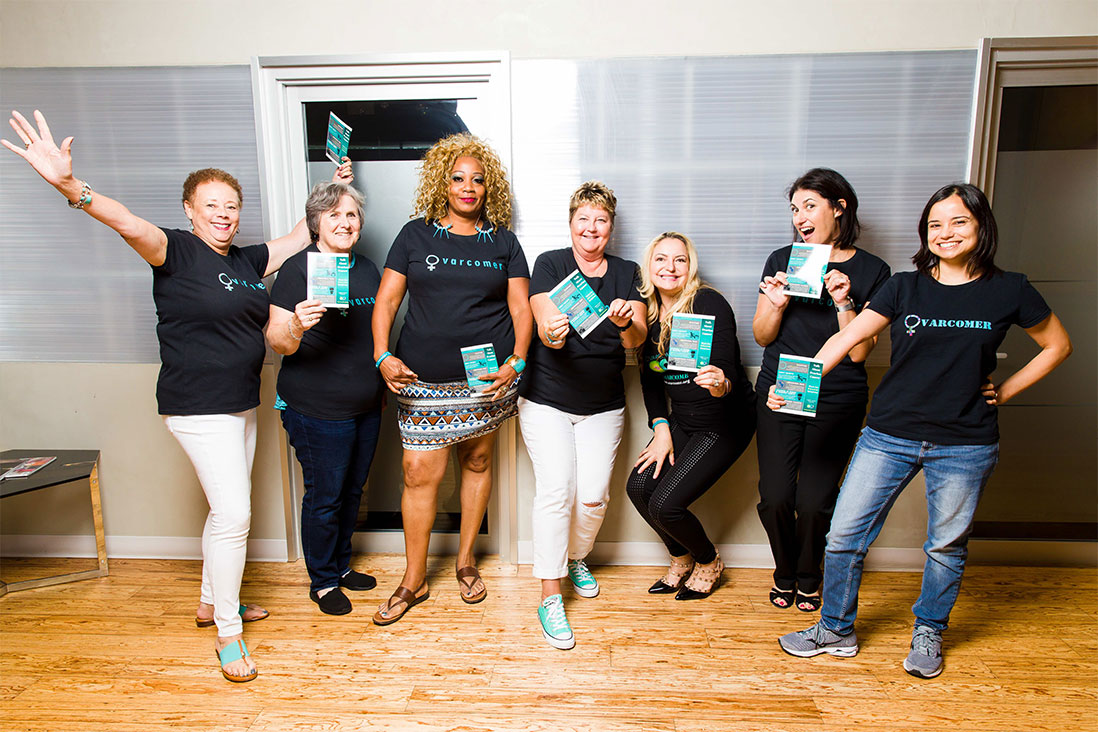Be Inspired
OVARCOMER Beth Patterson is Talking About Ovarian Cancer and changing the conversation. Beth took our B.E.A.C.H. symptom cards to her Primary Care Doctor to distribute at the waiting rooms. Beth wants you to know about the symptoms, ask questions and advocate for your own health.
Empower yourself. Champion Early Detection. Together We Can Ovarcome.
Ovarian Cancer: Awareness is Key
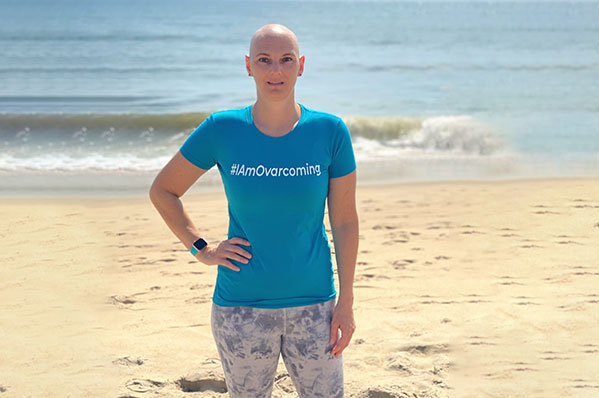
Learn & Share The B.E.A.C.H. Symptoms:
- B = Bloating
- E = Early Satiety or feeling full quickly
- A = Abdominal and/or Pelvic Pain
- C = Changes in Bowel & Bladder Habits
- H = Heightened Fatigue
Ovarian Cancer Facts
- Number 1 Deadliest Gynecologic Cancer with no reliable screening
- 1 in 75 women develop the disease in their lifetime
- Ovar 70% of women are diagnosed at an advanced stage
- Every woman is at risk of Ovarian Cancer. Every person with ovaries is at risk of ovarian cancer
- Genetic mutation such as BRCA and strong family history may increase risk of ovarian cancer
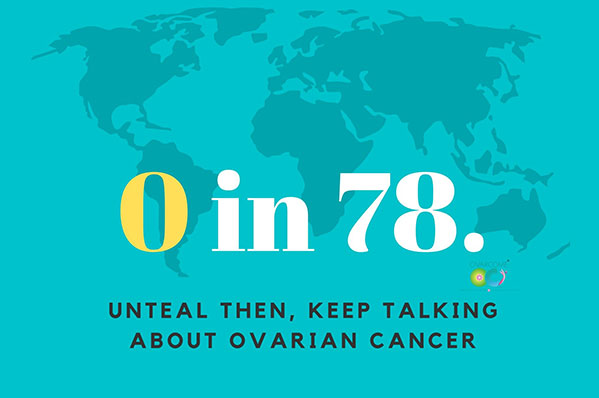
Learn About the Basic Ovarian Cancer Biology
This video is intended to provide a basic overview of the biological mechanisms behind ovarian cancer and its treatment and is for informational purposes only. It is not intended to provide medical guidance related to diagnosis, treatment, or related topics. We are grateful to our Advisory Board Member Dr. Anirban Maitra for verifying the scientific accuracy of all the information presented.
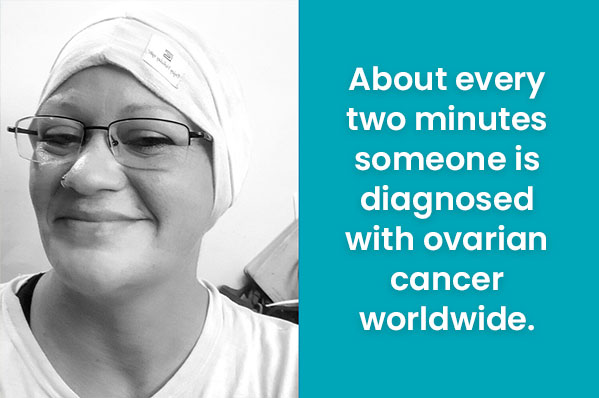
Ovarian Cancer Prevention
- No reliable early detection test for ovarian cancer exists today
- Breast feeding and birth control pills significantly lower the risk of ovarian cancer
- Learning and understanding family history & Genetics is an important step towards prevention
- In the absence of a test, awareness is best
- Ask about ovarian cancer at your well woman visits
Download our B.E.A.C.H. Symptom Card
Prevention
There are no standard recommendations for screening for ovarian cancer. In the absence of test,
awareness is best. So stay on top of your symptoms and lead a healthy life!
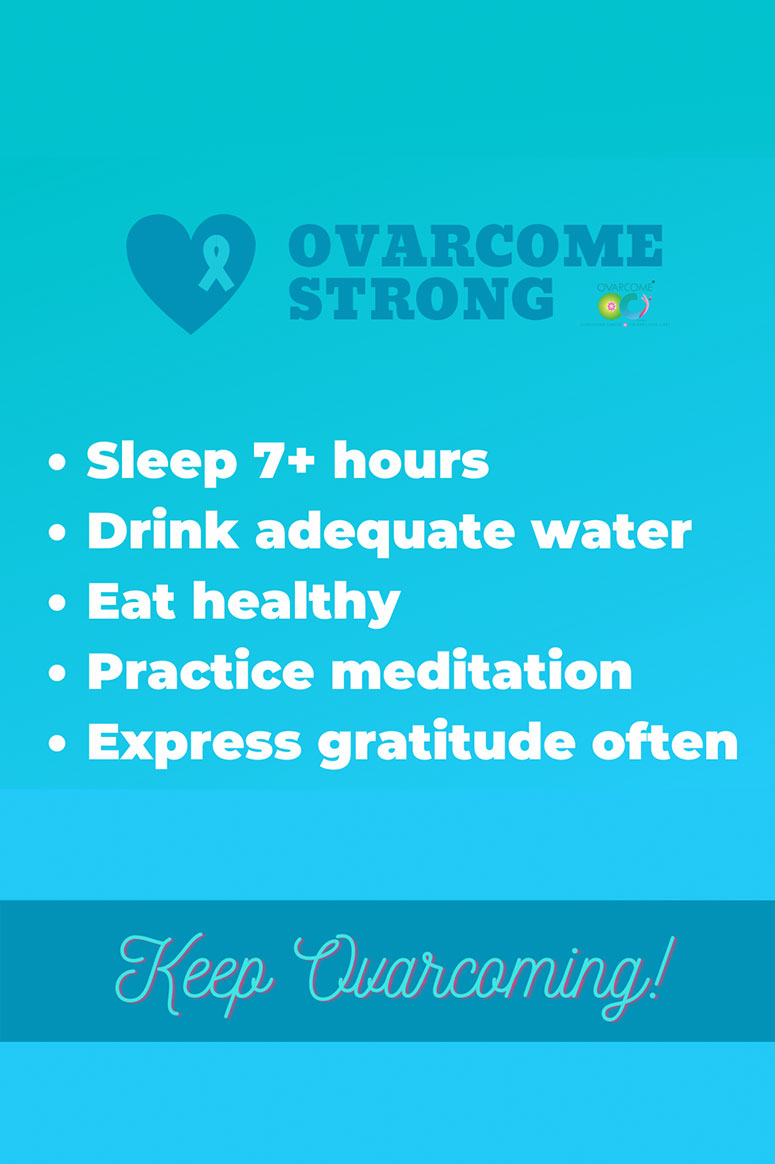
Living Your Best Life
Eat. Sleep. Be Happy. Repeat!
Set a routine bedtime/wake up time. Avoid daytime napping. Do not eat within 2 hours of bedtime. Limit alcohol and caffeine. Do not exercise within hour of bedtime. Do not “work” where you sleep. Do not watch TV, read, text, email where you sleep. Write down worries or distractions. Can’t sleep? Get up and do non-stimulating activity like reading. Good sleep at night will keep you refreshed and energized all day!
Reading is to mind what exercise is to body!
Exercise regularly! Take your child/pet for a brisk walk. Walk and talk, cell phones are great. Participate in your conference call while walking. Tune into fitness during TV time. Park and walk. Make it a competition to get farthest spot from the door! Take the stairs. Skip the cake, say goodbye to pie and take a walk after dinner. Get up earlier!
Stress: it is all in the attitude!
Learn to say “no”. Avoid hot-button topics. Pare down the “to do list”. Express your feelings appropriately and timely – rather than bottling up. Be willing to compromise. Be more assertive. Manage your time better. Plan ahead. Don’t over extend yourself. Focus on the positive. Look for the upside. Accept the things you cannot change. Share your feelings. Learn to Forgive.
Every time you eat or drink, you are either feeding a disease, or fighting it!
Recent studies have revealed that there is no set requirement of water per day – you should drink when you are thirsty. The amount of water you need depends on your physical weight, level of physical activity that day, as well as your environmental conditions. Make sure to eat breakfast every day. Focus on having small frequent meals during the day. Remember, portion control is the way to go!
Ovarian Cancer: NO effective screening yet! Stay on top of symptoms!
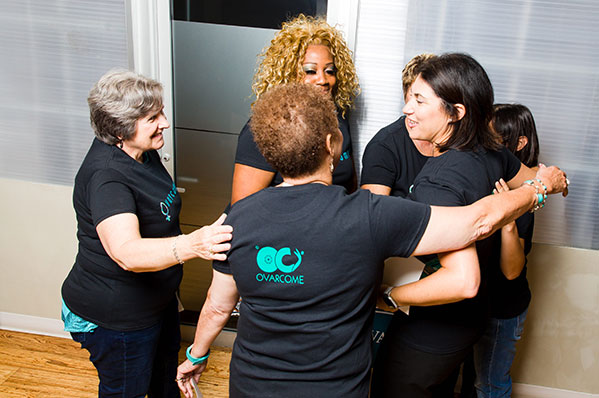 Family & Friends Support
Family & Friends Support
Understanding Changes
You carry out different roles every day. You may be a friend, a mother, a daughter, a wife, a sister, a boss, and a worker all at once. Each of these roles makes demands upon your time and energy. Fatigue and stress caused by your treatment may prevent you from duties that you once took for granted. If you are not able to meet these demands, you may feel guilty and become frustrated. You may not be able to do as much for your family as before. However, you still have a lot to offer through your love, your concern, and your friendship.
Communicate Independence
Because of your illness, your family and loved ones may try to protect you. Even though they mean well, you may feel like they are taking away your independence or your rights as an adult. After treatment, when you start feeling better, your loved ones may have become used to you in the role of a patient You may need to sit down together and discuss how to switch from the caretaker and sick person roles into your usual, more balanced roles.
Practice Mindfulness
While going through treatment, it is important to embrace, accept and pay attention to your thoughts and feelings without judging them — there is no “right” or “wrong” way to think or feel in a given moment.
Few simple tips to mindfulness:
- Be right here, right now
- Practice 4-7-8 breathing: take a deep breath in for a count of 4, hold for 7, exhale for 8
- Start practicing mindful eating: appreciate the aromas, colors, textures, and tastes of your food. Chew each bite carefully
- Practice simple meditation
